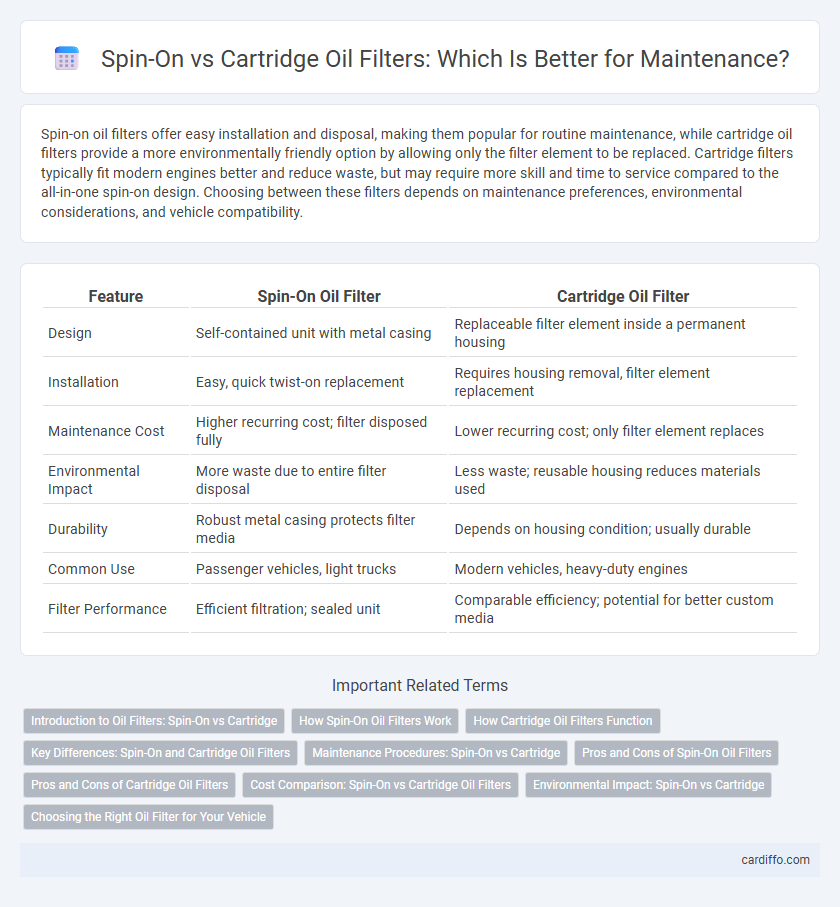Spin-on oil filters offer easy installation and disposal, making them popular for routine maintenance, while cartridge oil filters provide a more environmentally friendly option by allowing only the filter element to be replaced. Cartridge filters typically fit modern engines better and reduce waste, but may require more skill and time to service compared to the all-in-one spin-on design. Choosing between these filters depends on maintenance preferences, environmental considerations, and vehicle compatibility.
Table of Comparison
| Feature | Spin-On Oil Filter | Cartridge Oil Filter |
|---|---|---|
| Design | Self-contained unit with metal casing | Replaceable filter element inside a permanent housing |
| Installation | Easy, quick twist-on replacement | Requires housing removal, filter element replacement |
| Maintenance Cost | Higher recurring cost; filter disposed fully | Lower recurring cost; only filter element replaces |
| Environmental Impact | More waste due to entire filter disposal | Less waste; reusable housing reduces materials used |
| Durability | Robust metal casing protects filter media | Depends on housing condition; usually durable |
| Common Use | Passenger vehicles, light trucks | Modern vehicles, heavy-duty engines |
| Filter Performance | Efficient filtration; sealed unit | Comparable efficiency; potential for better custom media |
Introduction to Oil Filters: Spin-On vs Cartridge
Spin-on oil filters feature a self-contained design with a metal canister housing the filtering element, making installation and replacement straightforward in most vehicles. Cartridge oil filters consist of a replacement filter element inserted into a permanently mounted housing, requiring less metal waste and often allowing for improved engine packaging. Both types play crucial roles in maintaining engine oil cleanliness and preventing contaminants from causing wear or damage.
How Spin-On Oil Filters Work
Spin-on oil filters operate by screwing directly onto the engine block, housing a replaceable filter element inside a sealed canister. Oil enters through multiple small holes around the base, passes through a pleated filter media that traps contaminants, and exits through a central hole to recirculate within the engine. This design offers easy installation and disposal, reducing maintenance time compared to cartridge oil filters.
How Cartridge Oil Filters Function
Cartridge oil filters function by housing a replaceable filter element inside a permanent metal casing, directing engine oil through the internal filter media to trap contaminants without replacing the entire unit. This design allows for easier disposal of used filter elements and reduces waste, as only the internal filter cartridge is changed during maintenance. The slim profile and direct oil flow path in cartridge filters improve filtration efficiency and engine protection compared to conventional spin-on oil filters.
Key Differences: Spin-On and Cartridge Oil Filters
Spin-on oil filters come as a complete, disposable unit that combines the filter media and housing, making replacement quick and straightforward, while cartridge oil filters feature only the replaceable filter element inside a permanent housing, requiring more disassembly for maintenance. Spin-on filters generally offer easier installation and reduced mess, whereas cartridge filters provide better environmental benefits by reducing waste and often allow for improved filtration customization. Key differences include disposable versus reusable housings, installation complexity, and environmental impact, which influence maintenance frequency and overall cost-effectiveness.
Maintenance Procedures: Spin-On vs Cartridge
Spin-on oil filters offer straightforward maintenance with simple removal and replacement, making oil changes quicker and less messy. Cartridge oil filters require more detailed procedures, including careful removal of the housing, cleaning, and sealing before installing a new filter element. Proper maintenance of both types ensures engine longevity, but cartridge filters demand more precision and attention to sealing to prevent leaks.
Pros and Cons of Spin-On Oil Filters
Spin-on oil filters offer easy installation and disposal, making them convenient for routine maintenance and reducing overall service time. Their sealed design minimizes the risk of oil leaks and contaminants entering the engine, enhancing engine protection and reliability. However, these filters generate more waste compared to cartridge filters and may be less environmentally friendly due to the integrated metal casing.
Pros and Cons of Cartridge Oil Filters
Cartridge oil filters offer environmental benefits due to their reduced waste generation and easier recycling compared to traditional spin-on filters. They provide better sealing and are less prone to leaks, ensuring more efficient engine protection during maintenance. However, cartridge filters require more careful handling during replacement to avoid contamination, and their initial installation can be more complex, often needing specific tools.
Cost Comparison: Spin-On vs Cartridge Oil Filters
Spin-on oil filters generally have a lower initial cost compared to cartridge oil filters, making them a budget-friendly option for routine maintenance. Cartridge oil filters, while often more expensive upfront, can offer cost savings over time due to their reusable housing and easier replacement process. Evaluating long-term maintenance expenses and environmental impact is crucial when choosing between spin-on and cartridge oil filters.
Environmental Impact: Spin-On vs Cartridge
Spin-on oil filters generate more waste due to their disposable metal casing, contributing significantly to landfill accumulation and environmental pollution. Cartridge oil filters, designed with reusable housings and only replaceable filter elements, minimize waste and reduce the ecological footprint. Recycling cartridge filter components further enhances sustainability by lowering resource consumption and emissions associated with manufacturing new filters.
Choosing the Right Oil Filter for Your Vehicle
Selecting the right oil filter for your vehicle depends on factors such as engine type, maintenance preferences, and environmental impact. Spin-on oil filters offer ease of replacement and are widely compatible with most vehicles, while cartridge oil filters provide a more eco-friendly option with reusable housing that reduces waste. Understanding your vehicle's specifications and driving conditions ensures optimal engine protection and efficient maintenance.
Spin-On Oil Filter vs Cartridge Oil Filter Infographic

 cardiffo.com
cardiffo.com